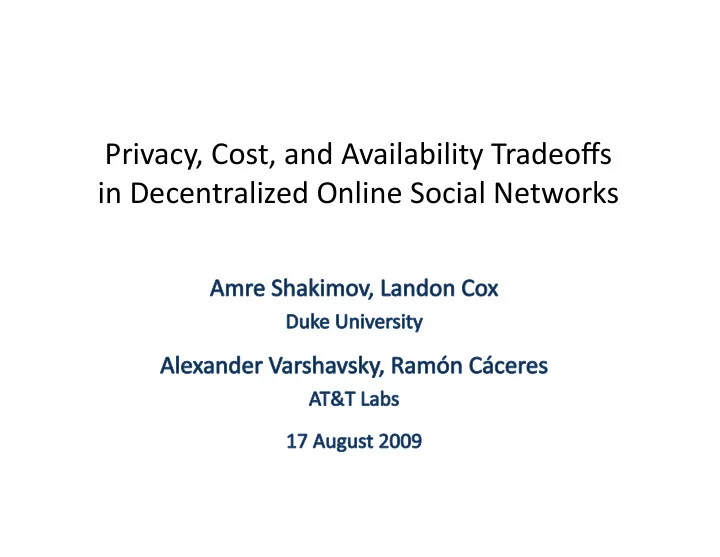

Privacy, Cost, and Availability Tradeoffs in Decentralized Online Social Networks
Online Social Networks (OSNs) are enormously popular Allow people to share informaDon such as personal profiles, photos, and messages with members of their social networks
Privacy issues with current OSNs • Services are centralized Hold data for millions of users in a single administraDve domain Vulnerable to large‐scale privacy breaches • Terms of service oJen grant providers rights to user data Provider may display and distribute data in any way it sees fit AdverDsing‐driven business models create incenDves to share data with third parDes in ways that may diminish user privacy • Prominent privacy violaDons have already been seen • Public awareness of privacy issues is growing
Other issues with centralized OSNs • May shut down and leave users without access to their data • May not provide users their data in an open format • May not be extensible in ways that users want • May not scale “Are all of these circumstances and conversa4ons going to push the social web over the edge, toward a more distributed and less centralized model?” New York Times, 11 August 2009
Vis‐à‐Vis distributed OSN framework • Each person keeps his private data on his own Virtual Individual Server (VIS) • VISs can be virtual machines • Private data is distributed across many administraDve domains • VIS owners maintain rights to data • VISs self‐organize into decentralized overlay networks, one overlay per social group with which VIS owners wish to share data • Mimics privacy expectaDons and trust relaDonships of offline social networks
Three distributed OSN approaches • Cloud‐based decentralizaDon • Desktop‐based decentralizaDon with socially informed replicaDon • Hybrid of cloud‐ and desktop‐based
Cloud‐based decentralizaDon Data 1 VIS 1 VIS 4 VIS 2 Data 4 Data 2 VIS 3 Data 3
Desktop‐based decentralizaDon with socially informed replicaDon Data 1 Replica 4 VIS 1 Data 4 Replica 1 VIS 4 VIS 2 Replica 3 Data 2 VIS 3 Data 3 Replica 2
Hybrid decentralizaDon Data 1 VIS 1 VIS 4 VIS 2 Data 4 Data 2 VIS 3 Data 3
Vis‐à‐Vis architecture • Two Ders of distributed hash tables (DHTs) – Top Der contains one DHT for the Meta Group – BoXom Der contains one DHT per social group • Supports a wide variety of groups Open or restricted, public or secret, … • Enables scalable operaDons Create, join, leave, insert, query, … • Framework for many popular OSN features Suggest friends, plug in third‐party apps, …
Vis‐à‐Vis prototype • OSN soJware – Pastry for basic DHT funcDonality – Scribe for mulDcast over DHTs – AddiDons to support groups and Meta Group • Base virtual machine soJware Full server soJware stack: Linux, Apache, MySQL, … • VISs deployed at Amazon EC2, Emulab, PlanetLab, Duke University, and AT&T Labs
LocaDons of 120 VISs on PlanetLab
Latency to join a restricted group
Many uses of a VIS besides OSN • Trusted resource‐rich proxy for mobile devices – Saves baXery, bandwidth, storage, processing on devices – Many possible applicaDons • ParDcipatory sensing SynchronizaDon and backup Other applicaDons… • LocaDon‐based services • Trusted online presence for VIS owners – Web server ‐ Other services… – Email server • Helps preserve owner privacy across all these uses • AmorDzes its cost across all these uses
Related Work • Distributed OSNs – PeerSoN [Buchegger & DaXa, 2009] – P2P OSN [CuDllo, Molva & Strufe, 2009] – Ego [Amick & Ypodimatopoulos, 2009] – DiSo (open‐source project) • Hide informaDon from centralized OSNs – NOYB [Guha, Tang & Francis, 2008] – flyByNight [Lucas & Borisov, 2008]
Summary • Current OSNs suffer from privacy and other problems • Vis‐à‐Vis is a decentralized OSN framework based on VISs Distributes data across many administraDve domains Gives people ownership and control over personal data • Three approaches to distributed OSNs based on VISs – Cloud‐based: high availability, high cost – Desktop‐based with socially informed replicaDon: low cost, complex replicaDon policies to achieve high availability – Hybrid: high availability, low cost, moderate complexity? • Important to explore alternaDves as public awareness of privacy issues grows and cost of compuDng drops
Recommend
More recommend